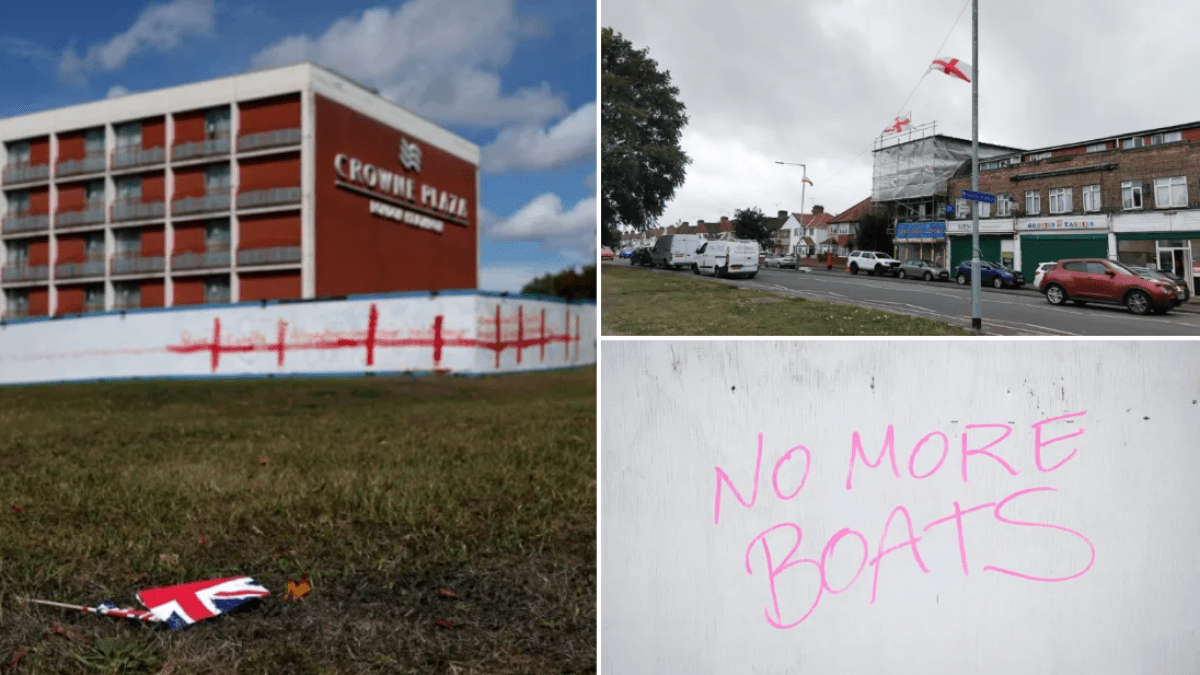In the west London borough of Hillingdon, swathes of English flags were hung from lamp posts about a week ago. They adorn the high street by West Drayton station and hang outside three hotels near Heathrow Airport that are used to house asylum seekers.
These hotels were targeted by a protest last weekend that led to five people being arrested and two officers suffering minor injuries. A group of masked men allegedly tried to enter the Crowne Plaza hotel through the rear entrance and damaged security fences. Around 500 protesters clad in flags marched to the site, where more demonstrations are expected on 13 and 20 September.
When The i Paper visited the area this week, some fencing remained damaged. The St George’s Cross was painted on parts of the security hoarding that surrounds the Crowne Plaza, but a message of peace was also spray-painted alongside it: “Love your neighbour. English decency. English fairness. English progressiveness.” Underneath the white paint were the faint outlines of the words “stop the boats”.
“I’ve got nine kids and I’m worried for every single one of them” says 52-year-old ex-court officer Justin. Locals in Hillingdon shared their thoughts on asylum hotels and England flags amid anti-migrant protests in the area. Richard, who works locally, said “I don’t like the flags being on display like that. I think that that’s getting very dangerous in terms of, you know, nationalism and xenophobia”. #politics #ukpolitics
♬ Curious – Healing And Spirit Health & DJ Hoobidibbie
The contradictory messages epitomise a community that has been divided by the issue of migration. Hillingdon has 2,238 asylum seekers living in hotels and contingency accommodation – around one in 14 of the total across the UK and more than any other local authority, according to the Home Office. The Tory-run council is considering legal action to stop six hotels from being used to house migrants.
While some locals said they had concerns about the use of hotels, others said they were alarmed by the demonisation of migrants and xenophobia they felt flags were being used to convey.
‘I fear for my nine children’
Justin Jones is among those who wants to see the hotels closed and immigration reduced. “This is broken Britain,” he said. “We need to fix Britain first before we can help anybody else, to be quite honest with you. We need to start here before we can go helping anybody else. It’s just wrong.”
He said he will be attending the protest on the 13th to “help the English voice be heard”, adding: “We’ve become a minority in our own country and we should be treated all as equals.”
Mr Jones, 52, said there are “far too many people” coming to the UK and the Government is “ignoring what Britain needs”. He believes there aren’t enough homes and jobs for Britons, let alone asylum seekers, and worries about extra pressures on the NHS.
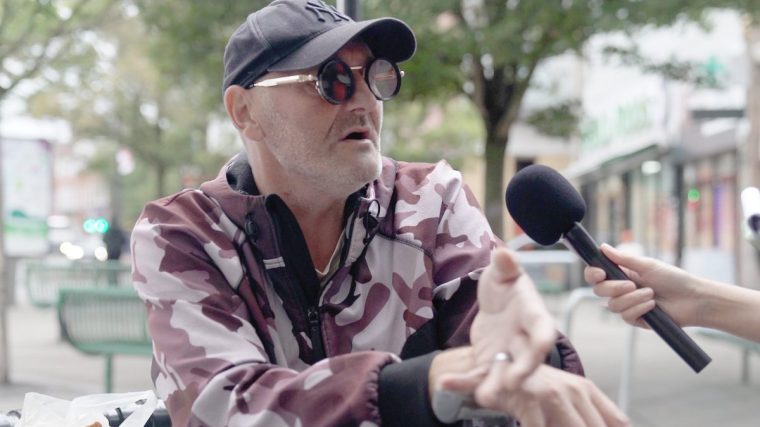 Justin Jones said there are “far too many people” coming to the UK (Photo: Robbie Hawken/The i Paper)
Justin Jones said there are “far too many people” coming to the UK (Photo: Robbie Hawken/The i Paper)
He said he also feels that migrants pose a threat to the safety of his children. “I am worried,” he said, choking up. “I’ve got nine kids and I’m worried for every single one of them. It absolutely petrifies me.”
Protests across the country were initially sparked by the arrest of an asylum seeker being housed in a hotel in Epping, who was this week found guilty of sexually assaulting a 14-year-old girl.
Mr Jones, a former court officer who is no longer able to work after sustaining an injury, said he wants to see the hotels close and illegal immigration reduced. He questioned why migrants were coming to England instead of staying in France, which is also a safe country with “more space”. He said the flags are “patriotic” and show pride in England.
Yatin Gawas, a 38-year-old bartender and student, supports the protests “because of the migrants staying in the hotels but without paying any tax or anything”.
Andrea, a 36-year-old store manager and Romanian immigrant, said she is not “against” asylum seekers but thinks they should be given a limited timeframe to get their claim approved and if they do not, they should be sent back to their home countries.
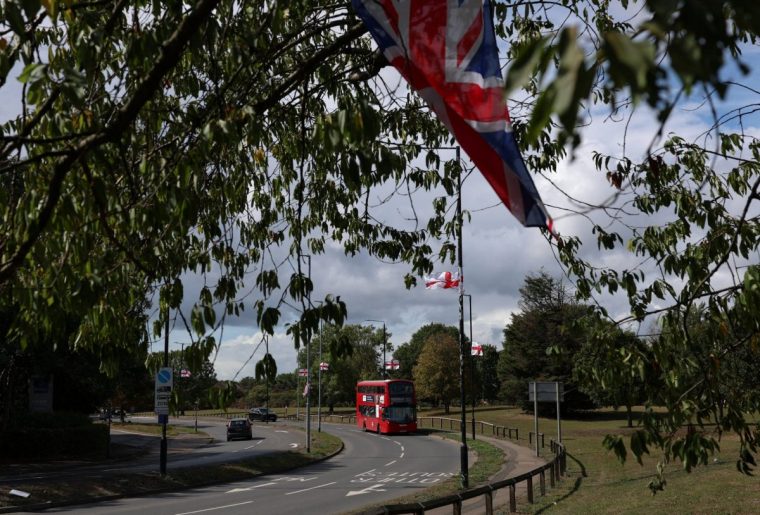 Flags of England hang from lamp posts as a Union Jack hangs from a tree near the Crowne Plaza hotel (Photo: Hannah McKay/Reuters)
Flags of England hang from lamp posts as a Union Jack hangs from a tree near the Crowne Plaza hotel (Photo: Hannah McKay/Reuters)
“Otherwise they’re going to keep coming and coming, and there’s no more space for people anymore,” she said. “They are not quite well-behaving. For me, as a taxpayer, to pay just for someone to sit in a hotel, have food and phone, and cigarettes and whatever, I don’t agree with this.
“I don’t get any benefits. I’m working full time. My daughter is in childcare, so everything I’m earning I’m paying for childcare services. For me to pay more than £1,000 every month in tax just for them to sit in a hotel is not fair.”
Dr Kahled Awad, 55, said he does not blame asylum seekers and believes the Government has mismanaged immigration. He said the hotels are needed because the migrants are already here and “have to be somewhere unless you want to put them on the street”.
Dr Awad, a retired doctor who moved to the UK 35 years ago from Egypt, said the root causes of asylum claims need to be addressed. A lot of people are here because of political problems in their own countries that Western countries are contributing to, he said.
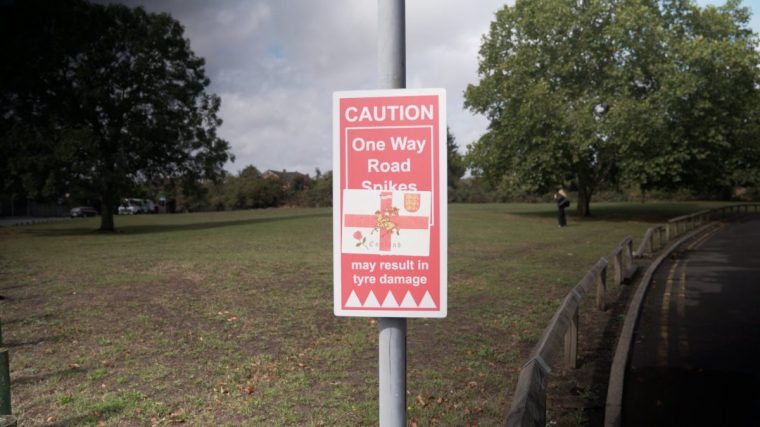 A flag pasted on a sign on the road leading to the Crowne Plaza hotel (Photo: Robbie Hawken/The i Paper)
A flag pasted on a sign on the road leading to the Crowne Plaza hotel (Photo: Robbie Hawken/The i Paper)
He believes the Government is giving out too many “handouts” and had made the UK a more appealing destination than other countries like Germany, where he lives some of the time. “It’s not fair for us – we pay taxes,” he said. “If they need some help, let them be proactive. For the help they get, they should produce something in return. If it’s easy money, everybody will go for it.”
His friend Yassev Elbolty, 45, who also moved to Britain from Egypt and works at Heathrow Airport, agreed. “They are putting my tax money up every year,” he chimed in. “We are paying tax and more national insurance for these people. Make it easy for them to get a job.”
Dr Awad warned that Britons needed to “be careful of the right wing” and that the English flags strewn along the streets were sending a “dangerous message”.
“Read history, see what happened in Nazi Germany,” he said. “It started something like [this] – a little thing then escalates and becomes a national problem.”
‘Migrants are scapegoats’
Alarm about a potential rise of the far-right was echoed by other residents including Richard Powell.
“I don’t like the flags being on display like that,” he said. “I think that that’s getting very dangerous in terms of nationalism and xenophobia.”
Mr Powell, 58, a writer, said the UK has “a lot to gain” from helping asylum seekers.
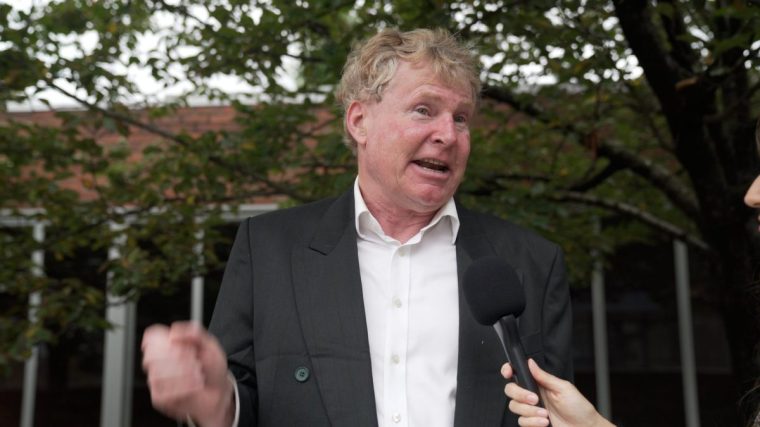 Richard Powell said he does not like the use of the flags (Photo: Robbie Hawken/The i Paper)
Richard Powell said he does not like the use of the flags (Photo: Robbie Hawken/The i Paper)
“Some of these people can be very valuable and useful to the UK,” he said. “In some cases, they’ve got good qualifications in some areas, and they can perhaps be valuable to the UK in terms of the work that they can do and the economic benefits that they can perhaps bring.”
Padraig Stapleton, 48, said “there might be too many people coming in” but “on a humane level, a lot of them are coming from war-torn situations and they do need to go somewhere”. He said he believes there are a lot of “angry people” around at the moment, jumping on the “anti-immigrant bandwagon”.
Originally from Ireland, he said he knows the power of flags and finds their erection in the area “not very comfortable”. “Every country should celebrate their heritage and everything,” he said, “but for me, there’s something a lot more sinister about it.”
‘We won’t take down the flags’
Councillor Ian Edwards, leader of Conservative-run Hillingdon Council, said he would prefer that people did not put up the flags but the local authority will not take them down. The council believes groups of residents have been using cherry pickers to put up the flags.
He said the English flag should be a “source of pride” for everyone, but added: “We’re not going to allow that identity to be stolen and associated with absolute extremists and thugs.”
He said new minority communities who may feel threatened by the “misuse” of the flag need to be reassured and encouraged to see the positive things it “says about us as a country” and about English values. “I’m not falling into the camp of ‘this is a racist flag’,” he said. “I dismiss that, and I just dismiss utterly, any parallel with the flying of the swastika by the Nazis. It’s repugnant to even suggest it.”
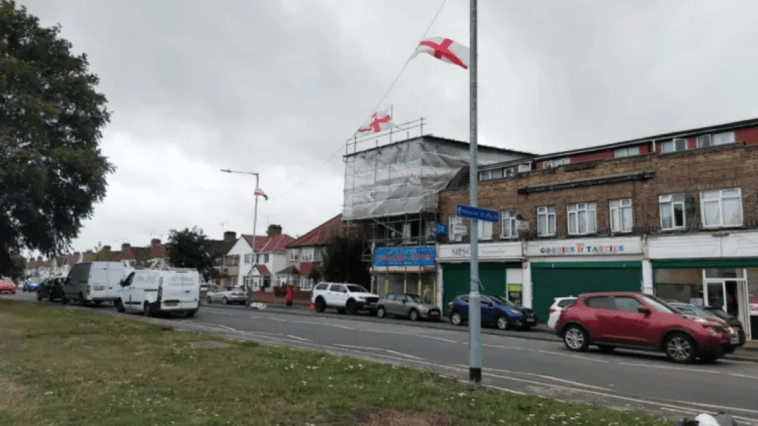 Flags hang on lamp posts along the high street (Photo: Alexa Phillips/The i Paper)
Flags hang on lamp posts along the high street (Photo: Alexa Phillips/The i Paper)
The council is waiting to see the outcome of Epping Forest District Council’s Supreme Court appeal before deciding whether it can take similar legal action to stop the use of hotels to house asylum seekers.
Hillingdon Council is paying £5m annually – the equivalent of its entire libraries and cultural services budget – to support people evicted from hotels by the Home Office and has had requests for extra government funding denied.
During the pandemic, the hotels around Heathrow airport were underused because of travel restrictions, which led to hotel owners signing deals with the Home Office.
“As long as they don’t fund and it puts pressure on our local communities, it builds this resentment that’s happening,” Cllr Edwards said. “Some of the protest is not against the hotels per se – some of it is a wider concern about just the fact that illegal immigration is not being stopped, and we’re continuing to see the evidence of that failure through the continued use of hotels.
“We have much wider concerns across our communities about the uncontrolled nature of immigration and the way that is impacting on the country, and in particular on our borough.”
Extra costs borne by the council
Asylum seekers are evicted from the hotels once their claims are approved, but some struggle to get housing and end up homeless. Cllr Edwards said they are not given council homes – those are reserved for long-term residents – but they have to help them find somewhere to live in the private sector. Because government benefits are not high enough to cover rents in the private sector, the council has to give landlords extra money to “sweeten the deal”, he added. About ten families a month need this kind of help.
A recent inspection of the hotels referred dozens of young people to the local authority, which then had to pay to assess whether they were children who needed to be placed in the care system. Most were sent back hotels because they were over 18 but the costs of the process were still borne by Hillingdon Council.
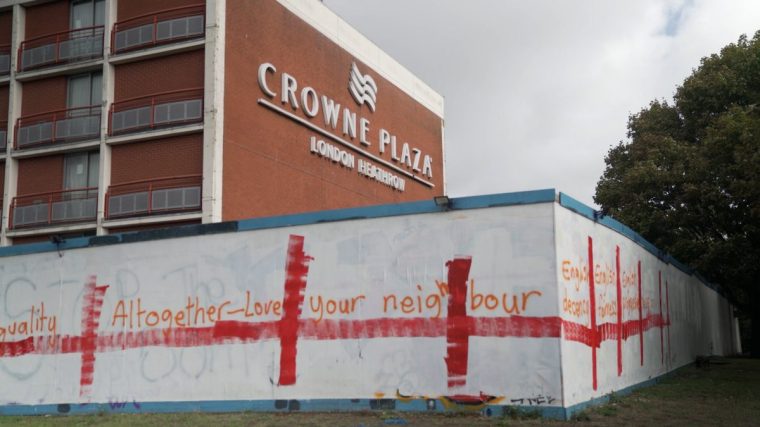 Men tried to break into the Crowne Plaza hotel, where migrants are housed (Photo: Robbie Hawken/The i Paper)
Men tried to break into the Crowne Plaza hotel, where migrants are housed (Photo: Robbie Hawken/The i Paper)
Asylum seekers also add pressure to health services and schools, which are not given extra funding to handle this, Cllr Edwards added.
After last weekend’s protest, he said the council is taking additional measures to prevent violence. The council is working with law enforcement to make sure the upcoming protests are “properly policed” and to identify “known agitators” from the recent protests. The council is looking into whether “civil powers” could be used to ban people from the borough.
Cllr Edwards suggested people turning up hooded and masked could also be targeted. “That, for me, is a clear indicator of people who wish to hide their identity because they are going to do something they don’t wish to be identified for doing,” he said.
Asylum seekers are ‘very scared’
Maryam Kanwer, a former asylum seeker who now volunteers with Care4Calais to help those in the Hillingdon hotels, said they have been “very scared” since the protests. She said protesters outside the hotels were “harassing” and “intimidating” them.
One hotel resident, a young cancer survivor in his twenties, witnessed and suffered torture at a very young age and was held in a detention centre in Pakistan. “He was telling me that he never thought that he would be treated like this, and he would be scared for his life in this country as well,” Ms Kanwer said. “It’s really, really heartbreaking.”
She said most people have become afraid of leaving the hotel and are staying inside. Two teenage girls in one of the hotels recently told her their mother would not let them go out even for groceries.
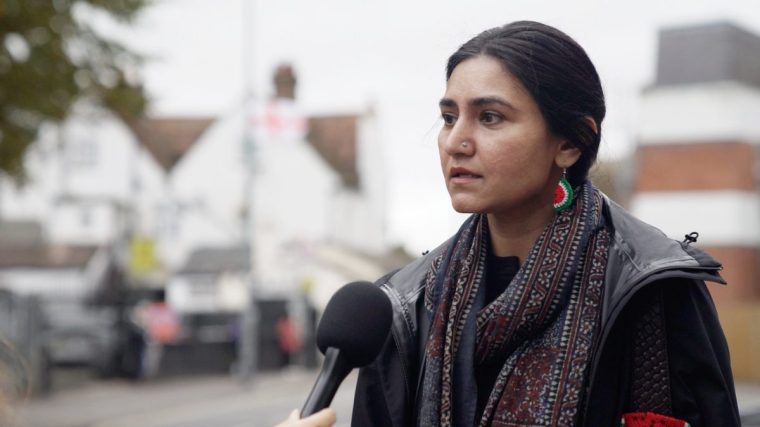 Maryam Kanwer volunteers with a charity that helps asylum seekers in Hillingdon (Photo: Robbie Hawken/The i Paper)
Maryam Kanwer volunteers with a charity that helps asylum seekers in Hillingdon (Photo: Robbie Hawken/The i Paper)
Ms Kanwer, who works as a researcher, came to the UK on a spouse visa with her husband, who was a student. An activist in Pakistan, she feared returning to her country in 2016 and claimed asylum. Although she never stayed in the hotels, the targeting of asylum seekers has rattled her too.
“A flag is fine, but now we know the intention of the flags,” she said. “It seems like an organised movement. I definitely feel scared, especially when I go to work. I feel scared, especially… near the Tube lines. I try to be at a distance from the train lines.”
There is a “myth” that hotels are luxurious places, she said. In reality, they are “cramped” – entire families have to share rooms and there are no play areas for children. Asylum seekers in the hotels receive £9.95 a week. Their meals are provided, but people with diabetes and other health conditions struggle with the quality of the food, she added.
“So many people, especially the young men, they come to me and they want to work,” she said. “They say, ‘Please, sister, find us work.’ But they are not allowed to work.”
When they leave the hotels, some end up homeless because of high rents and requirements from landlords, she said.
“They have been facing violence, persecution, torture – all kind of challenges,” she said. “They come here to seek safety and protection, which is a very basic human right.”
A Home Office source said local authorities already receive extra funding to support asylum seekers.
A government spokesperson said it inherited an asylum system in “chaos” and has taken “urgent action” over the past year to fix it, doubling the rate of asylum decision-making and reducing the amount of money spent on asylum hotels by almost a billion pounds.
They added: “We will continue to work closely with community partners across the country, and discuss any concerns they have, as we look to fix this broken system together and close every hotel by the end of this Parliament.”
